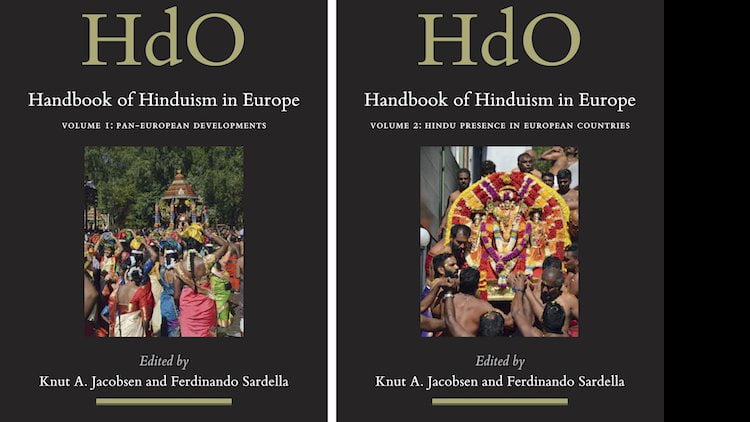Online Book Launch of the ‘Handbook of Hinduism in Europe’
By Kamala Priya Devi Dasi | Nov 27, 2021

The ’Handbook of Hinduism in Europe’ is the first encyclopedia to this extent that explains the development of Hinduism in Europe, its various traditions, the philosophy as well as describes Hindu-rooted movements such as ISKCON. The encyclopedia consists of two volumes with 65 chapters in total, written by 60 researchers from all over Europe. The editors are Prof. Knut A. Jacobsen from the University of Bergen (Norway) and Dr. Ferdinando Sardella from Stockholm University (Sweden), who are among the two leading researchers on Hinduism in the European Nordic countries. It has taken them four years to work on the volumes, including organizing a conference in 2017 at Stockholm University where the authors of the different chapters were invited. ‘Handbook of Hinduism in Europe’ has been published by the house Brill in Leiden, Netherlands, in July 2020.
The book launch was co-organized by the Oxford Center for Hindu Studies (UK), the University of Bergen, and Stockholm University. Thirty-seven participants both authors and guests interested in the topic, gathered on 22nd November online to be part of this unique event. Shaunaka Rishi Das and Prof. Gavin Flood from the OCHS opened the event with welcoming speeches thanking the editors and the authors for their hard work and valuable contributions to make this edition possible. After that, Prof. Knut A. Jacobsen presented an overview of all the chapters, which was followed by several speakers such as Prof. Ferdinando Sardella and Rasamandala Das who talked about their specific chapters in the book. The event went on for 100 minutes and was very well received. Shaunaka Rishi Das concluded the event with appreciative and grateful words.
In the first volume, we find articles such as ‘’German Indology and Hinduism’, ‘The European Construction of “Hindu Astronomy” (1700-1900)’, ‘Hinduism, Western Esotericism, and New Age Religion in Europe’, ‘Hindu Gurus in Europe’, ‘Swaminarayan Hinduism in Europe’, ‘Yoga in Europe’, ‘Ayurveda in Europe’, ‘Hindutva in Europe’, ‘Hinduism and Education in Europe’ or ‘The Hare Krishna Movement in Europe’ written by Luc De Backer.
The volumes give insights into how Hindu culture has contributed to Europe’s development through e.g. yoga, vegetarianism, the idea of reincarnation, or the principle of non-violence (ahimsa). But it also depicts the challenges that Hindus face in Europe, such as discrimination and misrepresentation of the Hindu religion and culture in the schoolbooks and media, or sectarianism of Hindu groups.
Hinduism is globally the third largest religion in the world, with one billion Hindus concentrated mostly in South Asia, and approx. two million in Europe. The growing economic, political and cultural relations between Europe and India significantly make the study of Hindus and Hinduism in Europe very relevant.
The encyclopedia ’Handbook of Hinduism in Europe’ is a handbook for scholars, teachers, students, politicians, religious leaders, and anyone who wants to know more about Hinduism, yoga, and Hindu-rooted movements such as ISKCON. It is an important contribution to a better understanding of Hinduism, its various traditions, its development in Europe, its contribution, and its challenges.
The books can be ordered at: brill.com















